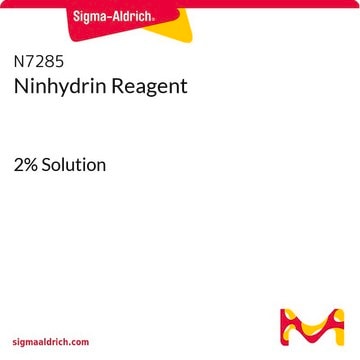Recommended Products
Quality Level
General description
The Kaiser test kit is used for free amino group detection. Ninhydrin interacts with primary amines, resulting in the dark blue color of the test, indicating the completion of the coupling process.
Application
Kaiser test kit is used in:
- Solid-phase peptide synthesis (SPPS) to detect the presence or absence of free amino groups
- Evaluating deprotection reactions to ensure that the necessary amino groups are available for subsequent reactions and functionalization
Signal Word
Danger
Hazard Statements
Precautionary Statements
Hazard Classifications
Acute Tox. 3 Dermal - Acute Tox. 3 Inhalation - Acute Tox. 3 Oral - Aquatic Chronic 2 - Eye Dam. 1 - Flam. Liq. 2 - Muta. 2 - Skin Corr. 1B - STOT RE 2
Target Organs
Nervous system,Kidney,Liver,Skin
Storage Class Code
3 - Flammable liquids
Flash Point(F)
62.6 °F
Flash Point(C)
17 °C
Choose from one of the most recent versions:
Already Own This Product?
Find documentation for the products that you have recently purchased in the Document Library.
Customers Also Viewed
John M Antos et al.
Current protocols in protein science, 89, 15-15 (2017-08-02)
Strategies for site-specific protein modification are highly desirable for the construction of conjugates containing non-genetically-encoded functional groups. Ideally, these strategies should proceed under mild conditions, and be compatible with a wide range of protein targets and non-natural moieties. The transpeptidation
Quantitative monitoring of solid-phase peptide synthesis by the ninhydrin reaction
Sarin VK, et al.
Analytical Biochemistry, 117(1), 147-157 (1981)
Color test for detection of free terminal amino groups in the solid-phase synthesis of peptides.
E Kaiser et al.
Analytical biochemistry, 34(2), 595-598 (1970-04-01)
Activating hidden signals by mimicking cryptic sites in a synthetic extracellular matrix
Y Zhu
Nature Communications, 14, 3635-3635 (2023)
Development of ErbB2-Targeting Liposomes for Enhancing Drug Delivery to ErbB2-Positive Breast Cancer
Ueno S, et al.
Pharmaceutics, 12(6), 585-585 (2020)
Our team of scientists has experience in all areas of research including Life Science, Material Science, Chemical Synthesis, Chromatography, Analytical and many others.
Contact Technical Service











